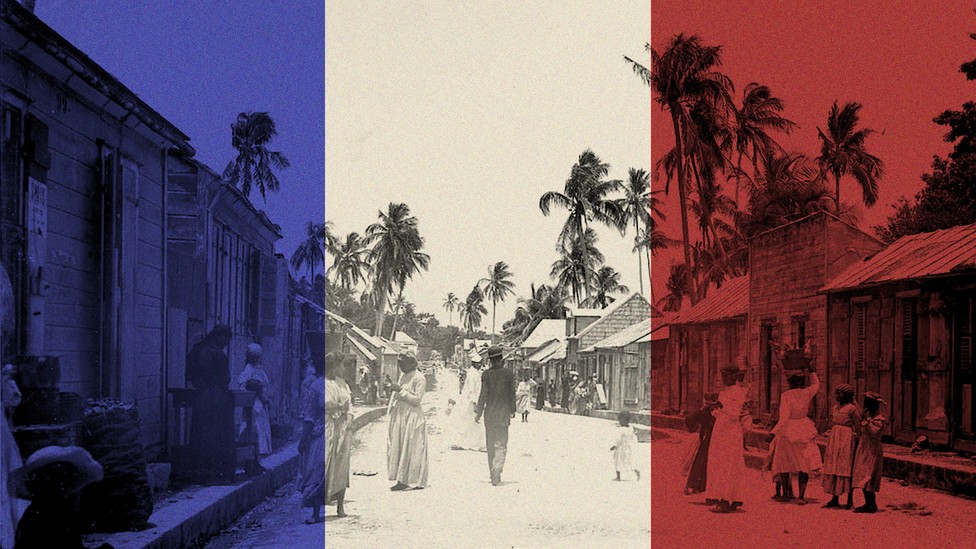Is Mayotte's Treatment By France A Reflection Of Colonial Attitudes?

Table of Contents
Historical Context: A Legacy of Colonialism in Mayotte
Understanding Mayotte's present requires examining its past. French colonial history in the region is deeply intertwined with the island's identity and current struggles. The colonization of Mayotte, along with the other islands of the Comoros archipelago, unfolded gradually, culminating in formal annexation by France in the late 19th and early 20th centuries. This process involved various treaties and agreements, often negotiated under circumstances that favored French interests.
- The impact of the Comoros' independence on Mayotte's decision to remain with France: In 1975, the Comoros declared independence from France, but Mayotte voted to remain under French rule in a referendum whose validity has been contested. This decision has shaped the island's relationship with its neighbors and fueled ongoing tensions.
- The strategic importance of Mayotte for France: Mayotte's geographical location in the Indian Ocean grants it significant strategic importance for France, particularly in terms of military and economic interests. This strategic value has arguably influenced France's policies toward the island.
- Differing perspectives on Mayotte's integration with France (local vs. French): While France views Mayotte's integration as a successful example of its overseas department model, many Mahorais (the people of Mayotte) express a desire for greater autonomy or even independence, highlighting a disparity in perspectives on the island's political status. This highlights the ongoing tension between French governance and the aspirations of the Mahorais people.
Political Status and Autonomy: A Limited Self-Determination
Mayotte's current political status as an overseas department of France grants it a degree of autonomy while ultimately remaining under French sovereignty. However, the extent of this self-governance is a subject of ongoing debate. The island sends elected representatives to the French Parliament, but crucial decisions concerning its economy and governance often reside with French authorities in Paris.
- The extent of Mayotte's autonomy and self-governance: While Mayotte has its own local council and elected officials, many crucial decisions affecting the island’s development remain under the control of the French government. This limits the island's capacity for true self-determination.
- The role of the French government in Mayotte's affairs: The French government plays a significant role in Mayotte's budgetary processes, infrastructure development, and security matters. This level of control is often viewed by some as a limitation on Mayotte's ability to chart its own course.
- The debate surrounding Mayotte's potential independence or greater autonomy: A significant portion of the Mahorais population advocates for greater autonomy or even complete independence from France, reflecting dissatisfaction with the current political status quo and the desire for self-determination. This highlights the ongoing struggle for genuine autonomy in Mayotte.
Economic Dependence and Neocolonial Practices
The economic relationship between Mayotte and France exhibits features that some argue constitute neocolonial practices. Significant financial support from France underpins Mayotte's economy, creating dependence while potentially limiting the island's economic diversification and self-sufficiency.
- French economic aid and its impact on Mayotte's economic development: While French economic aid contributes to Mayotte's development, it often comes with conditions that may not align with the island's specific needs or priorities. This dependence on external funding can hinder the development of a self-reliant economy.
- Dependence on France for financial support and resources: Mayotte's economy relies heavily on financial transfers and subsidies from the French government. This creates a vulnerability and dependence that can limit the island's economic independence.
- The presence of French multinational companies and their influence on the local economy: The presence of French multinational companies in Mayotte raises concerns about economic dominance and the potential displacement of local businesses and entrepreneurs. This can further contribute to economic inequalities and limit opportunities for the local population.
Social Inequality and Human Rights Concerns
Social inequalities in Mayotte are pervasive and deeply rooted in its history and current relationship with France. Issues of poverty, healthcare access, and education disproportionately affect marginalized communities, often linked to the colonial legacy and the ongoing challenges of managing immigration.
- Issues of poverty, healthcare, and education: Mayotte faces significant challenges in providing adequate healthcare and education to its population, particularly in more remote areas. Poverty rates remain high, leading to unequal access to essential services.
- Immigration and the treatment of migrant workers (Comorians): The significant influx of Comorian migrants seeking better economic opportunities raises concerns about the human rights of these migrants. Reports of poor living conditions, discrimination, and limited access to essential services are common.
- Human rights violations and discrimination: Human rights violations and discrimination against marginalized groups are ongoing challenges in Mayotte. Addressing these concerns requires a holistic approach that tackles structural inequalities and promotes inclusivity.
Conclusion
The relationship between Mayotte and France is undeniably complex, marked by a legacy of colonialism that continues to shape the island's present. While Mayotte benefits from its status as an overseas department, receiving financial aid and access to certain services, limitations on self-determination, significant economic dependence, and persisting social inequalities raise serious questions about whether France's approach truly reflects the interests and aspirations of the Mahorais people. The evidence suggests that neocolonial practices continue to influence Mayotte's development, hindering its path towards genuine self-sufficiency and equity.
The ongoing debate about Mayotte’s future requires continued attention and critical analysis. Further research is needed to fully understand the nuances of this relationship and to identify solutions that promote greater autonomy, economic self-reliance, and social justice for the people of Mayotte. Let's continue the conversation about Mayotte’s treatment by France and its implications for the future. Advocating for more equitable treatment and self-determination for the people of Mayotte is a crucial step toward a more just and sustainable future for the island.

Featured Posts
-
 Ufc 314 Volkanovski Vs Lopes Full Fight Card And Betting Odds
May 04, 2025
Ufc 314 Volkanovski Vs Lopes Full Fight Card And Betting Odds
May 04, 2025 -
 Analyzing The First Round Of The Nhl Stanley Cup Playoffs
May 04, 2025
Analyzing The First Round Of The Nhl Stanley Cup Playoffs
May 04, 2025 -
 Eneco Inaugure Son Grand Parc De Batteries A Au Roeulx Une Premiere Pour La Belgique
May 04, 2025
Eneco Inaugure Son Grand Parc De Batteries A Au Roeulx Une Premiere Pour La Belgique
May 04, 2025 -
 Is This Thing On New Photos Show Bradley Cooper Directing Will Arnett In Nyc
May 04, 2025
Is This Thing On New Photos Show Bradley Cooper Directing Will Arnett In Nyc
May 04, 2025 -
 Tony Todds Final Role In Final Destination Bloodline A Bittersweet Farewell
May 04, 2025
Tony Todds Final Role In Final Destination Bloodline A Bittersweet Farewell
May 04, 2025
